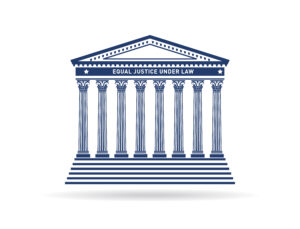 After the Court overruled Roe v. Wade with the Dobbs decision much of the public would likely answer that the Roberts Court’s lasting legacy will be doing away with a constitutional right to an abortion. This is even reflected in the public’s confidence in the Supreme Court which is now at a historic low.
After the Court overruled Roe v. Wade with the Dobbs decision much of the public would likely answer that the Roberts Court’s lasting legacy will be doing away with a constitutional right to an abortion. This is even reflected in the public’s confidence in the Supreme Court which is now at a historic low.
Looking at individual decisions though, the Roberts Court has structurally changed quite a bit of policy with landmark decisions in areas such as voting rights, partisan gerrymandering, same-sex marriage, etc.
If we needed to nail this question down to one area of law, a strong argument can be made that the most lasting legacy will be pushing policy in the direction of protecting conservative religious liberty interests.
Just this past week the Court had two decisions with huge implications with Carson v. Makin which overturned Maine’s non-sectarian requirement of tuition assistance and upheld an individual leader’s right to engage in a personal religious observance in the context of a school event with students present. Bremerton also essentially overturned the Lemon test which has been applied by lower courts in Establishment Clause cases for over 50 years.
What is a shorthand way to know that the cases shifted policy rightward? Both came down to 6-3 votes with the conservative justices in the majority and the liberal justices in dissent. Also knowing that the majority authors were Roberts and Gorsuch respectively is a giveaway.
This trend pushes back to 2005 when Roberts took over the position of Chief Justice from Rehnquist. Since then, the Court has decided 15 cases dealing with the First Amendment Establishment Clause or Free Exercise Clause including the two from this term. Below is a graph of the distribution of these cases across these two areas.

Only one of these decisions, Christian Legal Society of UC Hastings v. Martinez, was authored by a liberal justice and featured only liberal justices along with Justice Kennedy in the 5-4 majority. This was also the only majority opinion authored by a liberal justice – Justice Ginsburg. Below is a graph of the vote splits across these cases.

Each of the 14 other cases featured the conservative justices in the majority (Zubik v. Burwell was the only per curiam opinion without a majority opinion author and it was decided by a unanimous Court). Below is a graph of the majority authorship.

The list of cases includes some of the most prominent Roberts Court decisions including (and outside of the current term) Burwell v. Hobby Lobby, Trinity Lutheran, and American Legion.
Justice Kennedy was in the majority in all eight cases in which he participated. Justice Thomas was in the majority in 14 of the 15 (only not in Christian Legal Society). This is the same for Roberts and Alito (aside from Gonzalez v. O Centro since he did not participate in that decision).
On the other end of the spectrum, Justice Ginsburg dissented in seven of the 12 cases where she was present. Justice Sotomayor dissented in nine of 15 decisions.
Several news articles have proclaimed the Establishment Clause is dead (see e.g. this Bloomberg article).
What will we see moving forward? There are no First Amendment religion cases so far on the Court’s slate for the 2022 term, but a cert petition filed in a case that could make it to SCOTUS, Dr. A. v. Hochul, looks to potentially overturn a key Free Exercise Clause decision in Employment Division v. Smith. There are already 10 cert stage amicus briefs filed on behalf of this petition, so it has a lot of steam behind it.
Full list of Free Exercise and Establishment Clause cases decided by the Roberts Court
- Gonzalez v. O Centro (2006)
- Salazar v. Buono (2010)
- Christian Legal Society, UC Hastings v. Martinez (2010)
- Hosanna-Tabor v. EEOC (2012)
- Town of Greece v. Galloway (2014)
- Burwell v. Hobby Lobby (2014)
- Holt v. Hobbs (2015)
- Zubik v. Burwell (2016)
- Trinity Lutheran v. Comer (2017)
- American Legion v. American Humanist Association (2019)
- Espinoza v. MT Department of Revenue (2020)
- Our Lady of Guadalupe School v. Morrissey-Berru (2020)
- Tanzin v. Tanvir (2020)
- Carson v. Makin (2022)
- Kennedy v. Bremerton (2022)
Read more at Empirical SCOTUS…
Adam Feldman runs the litigation consulting company Optimized Legal Solutions LLC. For more information write Adam at [email protected]. Find him on Twitter: @AdamSFeldman.